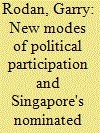| Srl | Item |
| 1 |
ID:
193654


|
|
|
|
|
| Summary/Abstract |
Research continues to find gender inequality in politics and political communication, but our understanding of the variation in the degree of bias across systems is limited. A recent meta-analysis reveals how, in countries with proportional representation (PR), the media pay considerably more attention to men politicians. In plurality systems, this bias is absent. The present study proposes a new explanation for this finding, emphasizing how the size of electoral districts moderates both the demand for and supply of women politicians in news reporting. Analyzing more than 600,000 news appearances made by Norwegian and British MPs from 2000 to 2016, we produce a detailed picture of gender biases in news visibility that speaks in favor of single-member districts in plurality systems. Although PR is generally recognized as advantageous for the political representation of women, our findings call for a more nuanced understanding of the link between electoral systems and gender equality.
|
|
|
|
|
|
|
|
|
|
|
|
|
|
|
|
| 2 |
ID:
181561


|
|
|
|
|
| Summary/Abstract |
For incumbents to be accountable for their issue stances, voters must sanction incumbents whose positions are “out of step” with their own. We test the electoral accountability of British legislators for their stance on Brexit. We find that there is very limited issue accountability. Individuals who disagreed with their representative’s stance on Brexit were 3 percentage points less likely to vote for them. The aggregate consequences of these individual effects are limited. A one-standard-deviation increase in the proportion of constituents agreeing with their incumbent’s Brexit stance is associated with an increase of 0.53 percentage points in incumbent vote share. These effects are one and a half times larger when the main challenger has a different Brexit stance to the incumbent. A follow-up survey of Members of Parliament (MPs) shows that MPs’ estimates of the effects of congruence are similar in magnitude. Our findings suggest that issue accountability is conditional in nature and limited in magnitude even for an issue such as Brexit, which should be maximally amenable to such effects.
|
|
|
|
|
|
|
|
|
|
|
|
|
|
|
|
| 3 |
ID:
091114


|
|
|
|
|
| Publication |
2009.
|
| Summary/Abstract |
Despite growing recognition that authoritarianism can be far more durable than transition theorists previously expected, transition theory assumptions continue to constrain attempts to understand authoritarian regimes. In particular, alternative avenues of political participation to opposition political parties and electoral contests are under examined. Singapore's authoritarian regime involves a range of such innovative institutional and ideological initiatives, one of the most significant being the Nominated Members of Parliament scheme. This promotes notions of representation different from democratic parliamentary representation that are not without appeal to targeted, emerging social forces. Singapore's political economy dynamics contribute to this responsiveness by obstructing independent power bases.
|
|
|
|
|
|
|
|
|
|
|
|
|
|
|
|
| 4 |
ID:
138269


|
|
|
|
|
| Summary/Abstract |
This article summarises the findings from a study of what constituents want from their local Member of Parliament.1 We make use of a survey technique known as conjoint analysis, wherein we present a national sample of British voters with profiles of hypothetical MPs who vary randomly in their characteristics, activities and behaviour. We find that voters like MPs who are independent from the party line and who do not focus exclusively on national policy work. MPs' gender and experience matter far less to constituents. Overall, voters want a Parliament made up of strong-minded MPs who see their role as that of a constituency representative. This has important implications for parliamentary democracy in Britain.
|
|
|
|
|
|
|
|
|
|
|
|
|
|
|
|